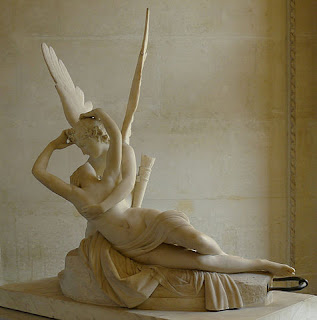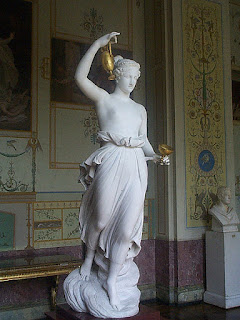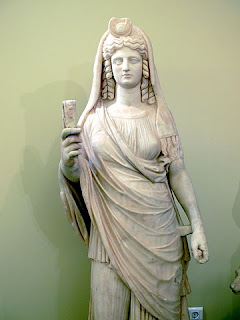 |
Statuee of Eros of
the Centocelle type. |
Eros (or Cupid in Roman mythology) is the the God of sexual love and beauty. His symbols include Bow, Arrows, Hearts, wings, and kisses. He is commonly depicted as a male having wings and holding a bow with arrows. His influence in the modern society is very spread and he and his symbols are displayed usually during the Valentine’s Day (14th of February). He has the ability to influence the feeling of both mortal and immortal gods including the gods from the Greek pantheon.
Origins
There are three main stories about his origins. According to early mythological sources, god Eros belongs to the primordial that appear at the creation of the cosmos. He played vital role in the creation of the remaining world. Hs is considered from the first gods to arrived to cosmos. The second version of the story tells that Eros was child of Chaos and Nyx (Night). She born Eros during the first ages of cosmos creation, but he wasn't the first one. The third story, and that was widely adopted later is that he is the the son of
goddess of beauty Aphrodite and Ares, the god of the war. Other less common stories about his birth including that he is the son of Ouranos and Gaia, or god Ouranos and
goddess Aphrodite. Other variation from the poet Alcaeus of Mytilene tells that he is the son of Zeuphyros (west wind) and Iris (rainbow). Less common story says that he is the son of Greek goddess of childbirth, Eileithyia.
Personal life - Psyche
 |
Eros stringing his bow, Roman copy after
Greek original by Lysippos. |
The myth between Eros and Psyche is one of the most famous stories of love in Greek and Roman mythology. Although the story is finalized in the Roman era, the roots are older during the Greek period.
According to the myth, the mortal princess Psyche was one of the most beautiful women on earth. Unfortunately, she did not properly worship the goddess of
beauty Aphrodite and the goddess got upset by her behavior. To punish her, she sends her son Eros to make her to fell in love with someone ugly. Eros had an accident and he scratched by his darts of love, making him to fell in love with her. As results, he didn't obey the orders of his mother,
goddess Aphrodite. AS the days passed and Psyche was not able to find love, her father decided to consult one oracle. The oracle answers that he should expect a dragon-like monster from the underworld as the lover of the Psyche, instead of a mortal human.
The father of Psyche was very sad when he heard the news and organized a ceremony that it is similar to a funeral. He demanded the presence of Psyche, although she reacted badly on the news. During the ceremony, they left her alone at the peak of a mountain. Then, the god of wed wind Zephyr took her and transferred to god Eros. After she arrived at a small forest, she started exploring the area, when she found a beautiful house. When she entered she heard the voice telling her to relax and guided her to the bedroom under the music of a lyre, when later she made love with god Eros. Eros never revealed himself as he kept the lights off, hiding his real identity.
When later her family learned about her new home, they started wondering how is living. Eros asked the west wind Zephyr to transfer her sisters to home. When the sisters saw where she was living they became jealous and planted evil seeds to her mind. They persuaded to kill the monster she was believing she was sleeping with. Eventually, she hides a dagger and a lamp inside the bedroom. During the night, when god Eros was asleep, she grabbed the dagger and used the lamp to light the room. Shen, she discovered who actually was, the god Eros.
 |
| Eros kisses Psyche by Antonio Canova, Louvre. |
She wake-up him by spilling a bit of oil to him. God Eros felt that she violated the trust between them and he decided to leave her near to a river (bank of the river). Then, she is discovered by the god of nature Pan, where she brings her back to his parent's house. Then, she started to search for her lost love. On the other hand, her sisters became more envious when learner who was really the husband of Psyche.
During his searching for Eros, she visited a number of temples where she requested help. Unfortunately, although the gods worshiped to these temples acknowledged that she needed help, they were banned from helping mortals against other gods. Then, she realized that she had to reach
goddess Aphrodite to solve her problems. When she finally reached her,
goddess Aphrodite was very hostile to her. To punish her she assigned her four trials.
The first trial was to separate heaps of wheat, chickpeas, lentils, and beans until the dawn. She did it with the help of kind ant that felt pity for her. The second task was to cross a river and bring back the golden wool from a sheep on the other side. She did it with the help of divinely inspired reed. The third task was to collect the black water from the rivers Styx and Cocytus using a crystal vessel.
God Zeus felt pity for her and helped her. The last trial was to go to the underworld, obtain a dose of the beauty of
the queen of underworld Persephone inside a box and bring it back. With instructions given from the tower, she was able to accomplish this task. Unfortunately, she opened the box before reaching
goddess Aphrodite and she was cursed by the infernal and Stygian sleep.
During the tasks, the god Eros recovered and he escaped from home, where his mother
goddess Aphrodite was keeping him. When he learned about the status of Psyche, he recovered her and took the case to the ruler of the gods,
Zeus.
God Zeus assembled the gods and announced that he approves the connection between Psyche and god Eros, and
goddess Aphrodite should stop punish her. He also decided for Psyche to drink ambrosia to become immortal, resulting in a happy marriage afterward. Together they had a daughter, Voluptas or Hedone (meaning physical pleasure, bliss).





